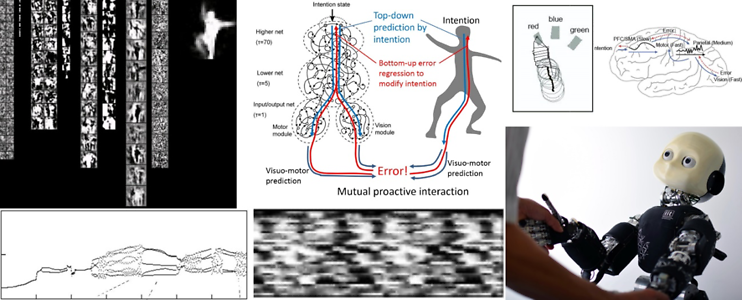Cognitive Neurorobotics Research Unit (Jun Tani)
Research Goals
The Cognitive Neurorobotics Research Unit is dedicated to investigating the principles of embodied cognition by conducting experimental studies in synthetic neurorobotics. The primary goals of our research are to understand:on how innate structures can be leveraged to develop cognitive constructs through iterative but limited behavioral experiences; how primary intersubjectivity in social cognition can be formed through enactive and contextual interactions with others; and how subjective experiences such as consciousness and free will can be scientifically and phenomenologically explained. In addition, our developmental neurorobotics approach is intended to uncover the underlying mechanisms of neurodevelopmental disorders, such as schizophrenia and autism. We are investigating these problems especially by extending and applying the frameworks of predictive coding and active inference to various robotic experiment platforms. Through these researches, we can expect to deepen our ontological understanding of human beings, rather than simply creating another smart machine-learning robot.
Research Positions (Ph.D, or Internship)
There are a limited Ph.D student or internship positions available for those who are interested in studying toward the above research goals collaboratively in our unit. The applicants should have strong background in programming, mathematics, and numerical analysis. We especifically invite applicants to the following research topics:
- Studies of various types of robot learning using recurrent neural network (RNN) models based on predictive coding and active inference framework. This could include more theoretical investigation on deterministic as well as stochastic dynamic modeling for predictive coding related to the free energy minimization principle.
- Studies on developmental robotics with focusing on the problem of generalization through stages of development. We hope that developmental processes during life-time learning spanning for months to years can be observed. This study may use reinforcement learning as well as active inference framework. We are also interested in conducting synthetic neurorobotics modeling studies on developmental disorders including schizophrenia and ASD.
- Studies on developmental social cognition with focusing on the problem of perception of self and others under experiment setup in human-robot or robot-robot contextual, enactive, and multimodal interaction. This study may also incorporate with research outputs from (1) and (2).
- Studies on development of the higher-order cognitive brain functions such as executive control and working memory usage.
- Studies on subjective experience including consciousness and free will of robots and human by conducting "human in robot-loop" experiments.
For the current OIST Ph.D students, one student per year can be accepted from those who have conducted lab rotation successfully in our unit.
Prospective PhD students currently outside of OIST should apply with the OIST Graduate School as the first step.
The applicants for postdoctoral scholars should have strong background in the related fields with outstanding publication and academic records. Such appicants should send a CV and research statement to tani1216jp “at” gmail.com with the header Research Position at Cognitive Neurorobotics Research Unit, OIST.
Applicants for internship should apply through the OIST internship program. Then, the graduate school and myself will examine the submitted applications. The admission to the program is competitive.
NEWS
- 2021 June, We received the Google Research Gift on the study of the application of the free energy principle. (2021/06/21)




